Steve Jobs' Leadership: Traits, Communication & Strategy
VerifiedAdded on 2023/06/12
|15
|3712
|101
Report
AI Summary
This report provides an analysis of Steve Jobs' leadership, focusing on his key traits, communication strategies, and impact on Apple's business strategy. It highlights Jobs' clear vision, passion, and ability to inspire as critical leadership qualities. The report explores how Jobs communicated organisational strategies effectively and whether he employed transactional or transformational leadership to drive business growth, concluding he was a transactional leader. It also includes a critical analysis of Transformational Leadership theory and Great Man/Trait Theory in the academic field, referencing inspirational motivation and intellectual stimulation. The report emphasizes the importance of strategic management and effective leadership in achieving a competitive edge in the corporate world. Desklib provides similar solved assignments for students.

Steve Jobs
Paraphrase This Document
Need a fresh take? Get an instant paraphrase of this document with our AI Paraphraser
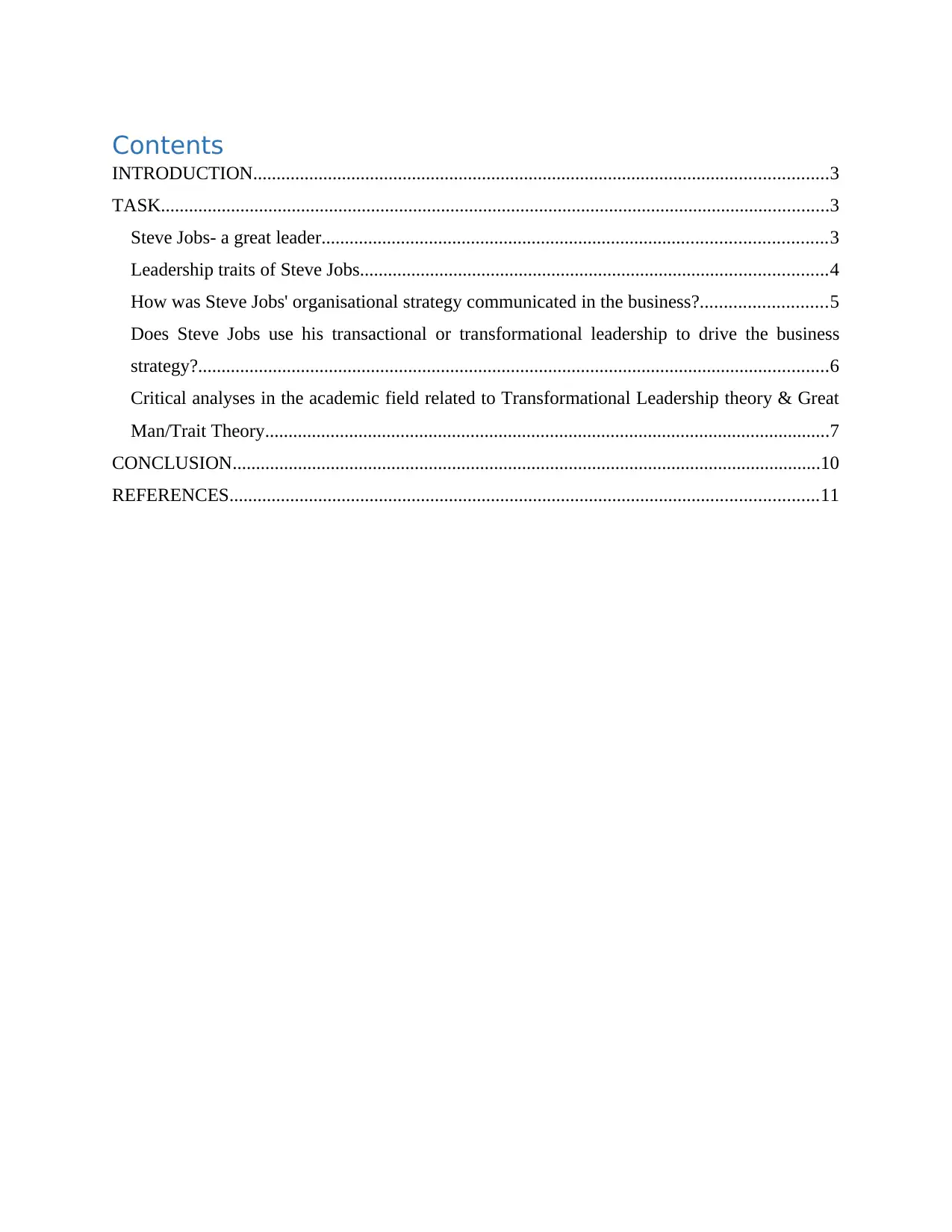
Contents
INTRODUCTION...........................................................................................................................3
TASK...............................................................................................................................................3
Steve Jobs- a great leader............................................................................................................3
Leadership traits of Steve Jobs....................................................................................................4
How was Steve Jobs' organisational strategy communicated in the business?...........................5
Does Steve Jobs use his transactional or transformational leadership to drive the business
strategy?.......................................................................................................................................6
Critical analyses in the academic field related to Transformational Leadership theory & Great
Man/Trait Theory.........................................................................................................................7
CONCLUSION..............................................................................................................................10
REFERENCES..............................................................................................................................11
INTRODUCTION...........................................................................................................................3
TASK...............................................................................................................................................3
Steve Jobs- a great leader............................................................................................................3
Leadership traits of Steve Jobs....................................................................................................4
How was Steve Jobs' organisational strategy communicated in the business?...........................5
Does Steve Jobs use his transactional or transformational leadership to drive the business
strategy?.......................................................................................................................................6
Critical analyses in the academic field related to Transformational Leadership theory & Great
Man/Trait Theory.........................................................................................................................7
CONCLUSION..............................................................................................................................10
REFERENCES..............................................................................................................................11
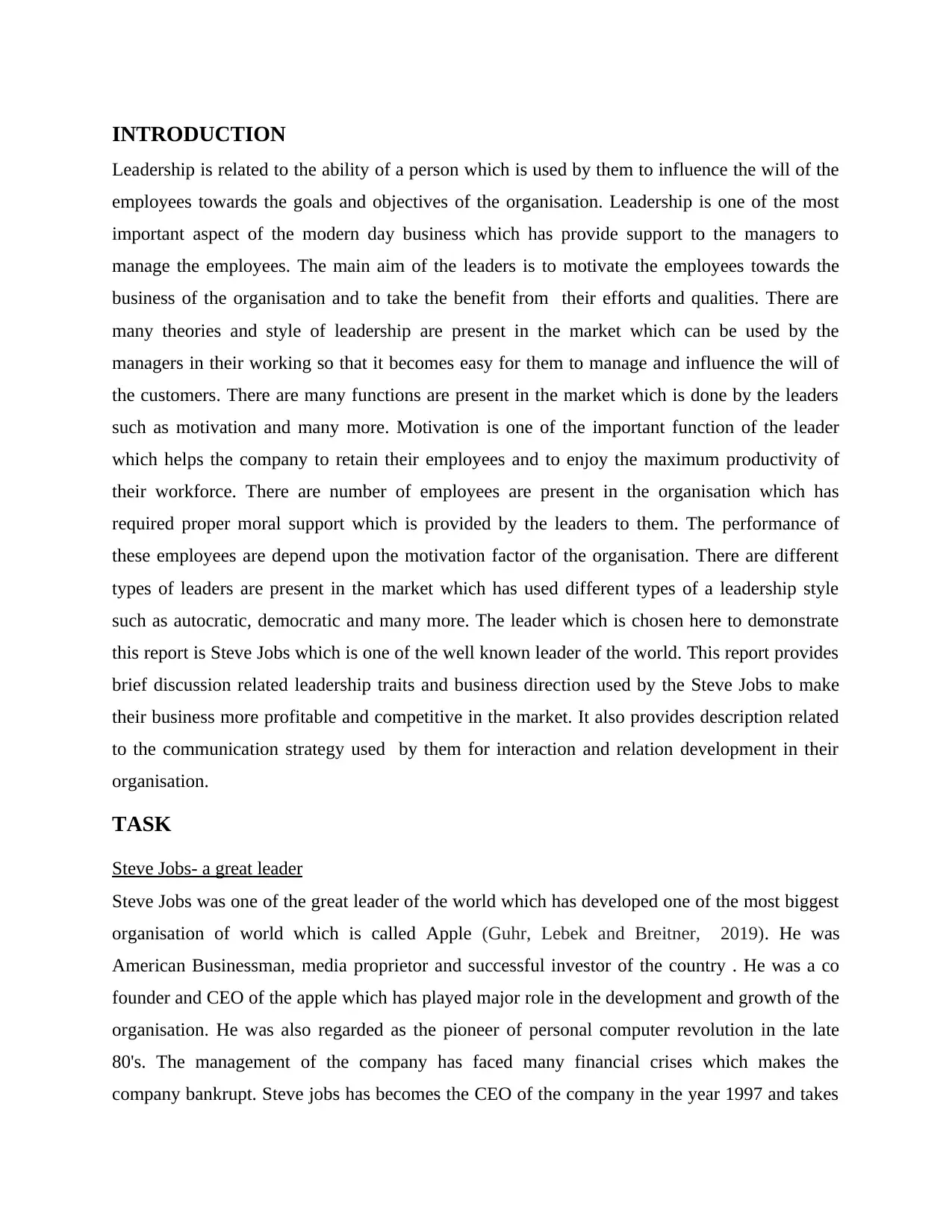
INTRODUCTION
Leadership is related to the ability of a person which is used by them to influence the will of the
employees towards the goals and objectives of the organisation. Leadership is one of the most
important aspect of the modern day business which has provide support to the managers to
manage the employees. The main aim of the leaders is to motivate the employees towards the
business of the organisation and to take the benefit from their efforts and qualities. There are
many theories and style of leadership are present in the market which can be used by the
managers in their working so that it becomes easy for them to manage and influence the will of
the customers. There are many functions are present in the market which is done by the leaders
such as motivation and many more. Motivation is one of the important function of the leader
which helps the company to retain their employees and to enjoy the maximum productivity of
their workforce. There are number of employees are present in the organisation which has
required proper moral support which is provided by the leaders to them. The performance of
these employees are depend upon the motivation factor of the organisation. There are different
types of leaders are present in the market which has used different types of a leadership style
such as autocratic, democratic and many more. The leader which is chosen here to demonstrate
this report is Steve Jobs which is one of the well known leader of the world. This report provides
brief discussion related leadership traits and business direction used by the Steve Jobs to make
their business more profitable and competitive in the market. It also provides description related
to the communication strategy used by them for interaction and relation development in their
organisation.
TASK
Steve Jobs- a great leader
Steve Jobs was one of the great leader of the world which has developed one of the most biggest
organisation of world which is called Apple (Guhr, Lebek and Breitner, 2019). He was
American Businessman, media proprietor and successful investor of the country . He was a co
founder and CEO of the apple which has played major role in the development and growth of the
organisation. He was also regarded as the pioneer of personal computer revolution in the late
80's. The management of the company has faced many financial crises which makes the
company bankrupt. Steve jobs has becomes the CEO of the company in the year 1997 and takes
Leadership is related to the ability of a person which is used by them to influence the will of the
employees towards the goals and objectives of the organisation. Leadership is one of the most
important aspect of the modern day business which has provide support to the managers to
manage the employees. The main aim of the leaders is to motivate the employees towards the
business of the organisation and to take the benefit from their efforts and qualities. There are
many theories and style of leadership are present in the market which can be used by the
managers in their working so that it becomes easy for them to manage and influence the will of
the customers. There are many functions are present in the market which is done by the leaders
such as motivation and many more. Motivation is one of the important function of the leader
which helps the company to retain their employees and to enjoy the maximum productivity of
their workforce. There are number of employees are present in the organisation which has
required proper moral support which is provided by the leaders to them. The performance of
these employees are depend upon the motivation factor of the organisation. There are different
types of leaders are present in the market which has used different types of a leadership style
such as autocratic, democratic and many more. The leader which is chosen here to demonstrate
this report is Steve Jobs which is one of the well known leader of the world. This report provides
brief discussion related leadership traits and business direction used by the Steve Jobs to make
their business more profitable and competitive in the market. It also provides description related
to the communication strategy used by them for interaction and relation development in their
organisation.
TASK
Steve Jobs- a great leader
Steve Jobs was one of the great leader of the world which has developed one of the most biggest
organisation of world which is called Apple (Guhr, Lebek and Breitner, 2019). He was
American Businessman, media proprietor and successful investor of the country . He was a co
founder and CEO of the apple which has played major role in the development and growth of the
organisation. He was also regarded as the pioneer of personal computer revolution in the late
80's. The management of the company has faced many financial crises which makes the
company bankrupt. Steve jobs has becomes the CEO of the company in the year 1997 and takes
⊘ This is a preview!⊘
Do you want full access?
Subscribe today to unlock all pages.

Trusted by 1+ million students worldwide
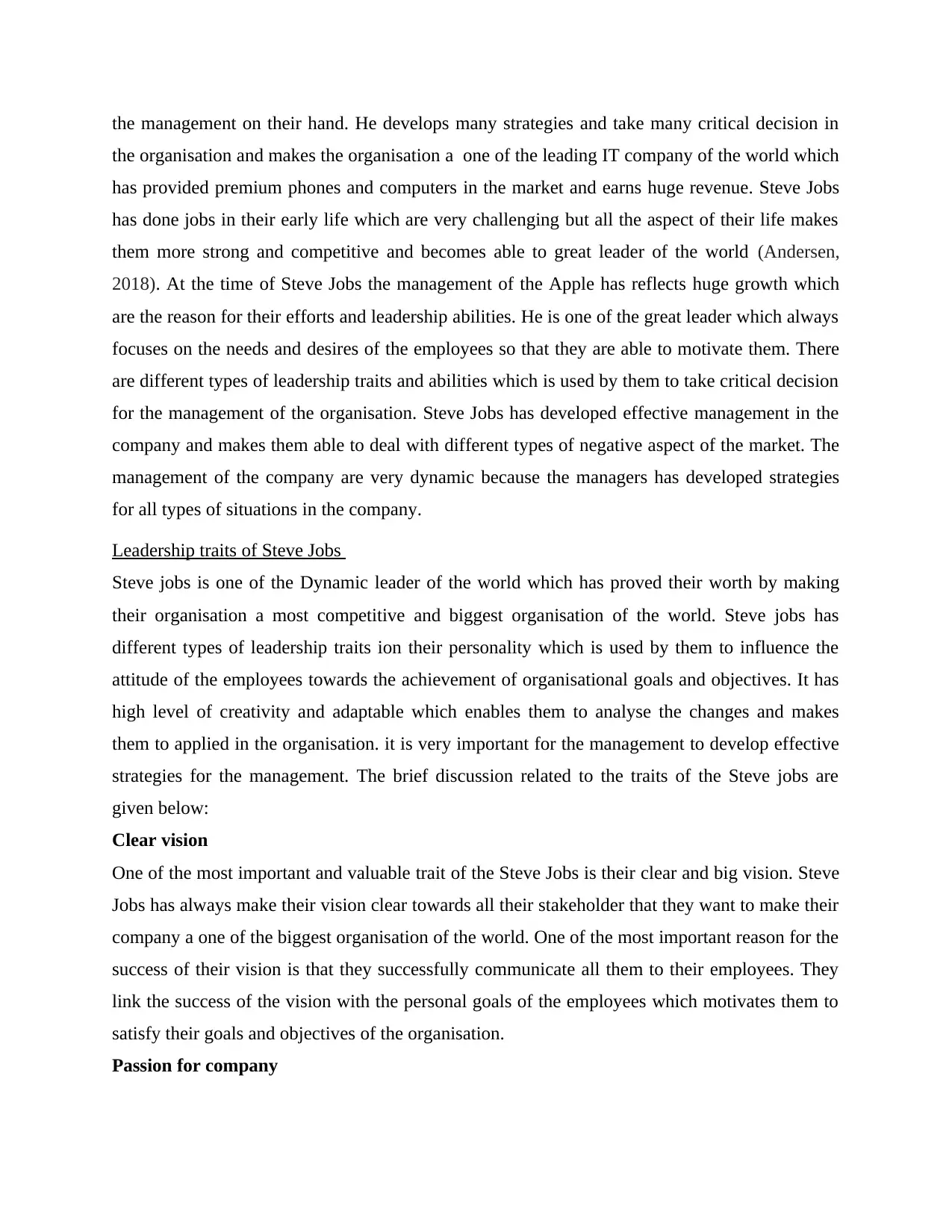
the management on their hand. He develops many strategies and take many critical decision in
the organisation and makes the organisation a one of the leading IT company of the world which
has provided premium phones and computers in the market and earns huge revenue. Steve Jobs
has done jobs in their early life which are very challenging but all the aspect of their life makes
them more strong and competitive and becomes able to great leader of the world (Andersen,
2018). At the time of Steve Jobs the management of the Apple has reflects huge growth which
are the reason for their efforts and leadership abilities. He is one of the great leader which always
focuses on the needs and desires of the employees so that they are able to motivate them. There
are different types of leadership traits and abilities which is used by them to take critical decision
for the management of the organisation. Steve Jobs has developed effective management in the
company and makes them able to deal with different types of negative aspect of the market. The
management of the company are very dynamic because the managers has developed strategies
for all types of situations in the company.
Leadership traits of Steve Jobs
Steve jobs is one of the Dynamic leader of the world which has proved their worth by making
their organisation a most competitive and biggest organisation of the world. Steve jobs has
different types of leadership traits ion their personality which is used by them to influence the
attitude of the employees towards the achievement of organisational goals and objectives. It has
high level of creativity and adaptable which enables them to analyse the changes and makes
them to applied in the organisation. it is very important for the management to develop effective
strategies for the management. The brief discussion related to the traits of the Steve jobs are
given below:
Clear vision
One of the most important and valuable trait of the Steve Jobs is their clear and big vision. Steve
Jobs has always make their vision clear towards all their stakeholder that they want to make their
company a one of the biggest organisation of the world. One of the most important reason for the
success of their vision is that they successfully communicate all them to their employees. They
link the success of the vision with the personal goals of the employees which motivates them to
satisfy their goals and objectives of the organisation.
Passion for company
the organisation and makes the organisation a one of the leading IT company of the world which
has provided premium phones and computers in the market and earns huge revenue. Steve Jobs
has done jobs in their early life which are very challenging but all the aspect of their life makes
them more strong and competitive and becomes able to great leader of the world (Andersen,
2018). At the time of Steve Jobs the management of the Apple has reflects huge growth which
are the reason for their efforts and leadership abilities. He is one of the great leader which always
focuses on the needs and desires of the employees so that they are able to motivate them. There
are different types of leadership traits and abilities which is used by them to take critical decision
for the management of the organisation. Steve Jobs has developed effective management in the
company and makes them able to deal with different types of negative aspect of the market. The
management of the company are very dynamic because the managers has developed strategies
for all types of situations in the company.
Leadership traits of Steve Jobs
Steve jobs is one of the Dynamic leader of the world which has proved their worth by making
their organisation a most competitive and biggest organisation of the world. Steve jobs has
different types of leadership traits ion their personality which is used by them to influence the
attitude of the employees towards the achievement of organisational goals and objectives. It has
high level of creativity and adaptable which enables them to analyse the changes and makes
them to applied in the organisation. it is very important for the management to develop effective
strategies for the management. The brief discussion related to the traits of the Steve jobs are
given below:
Clear vision
One of the most important and valuable trait of the Steve Jobs is their clear and big vision. Steve
Jobs has always make their vision clear towards all their stakeholder that they want to make their
company a one of the biggest organisation of the world. One of the most important reason for the
success of their vision is that they successfully communicate all them to their employees. They
link the success of the vision with the personal goals of the employees which motivates them to
satisfy their goals and objectives of the organisation.
Passion for company
Paraphrase This Document
Need a fresh take? Get an instant paraphrase of this document with our AI Paraphraser

Steve Jobs always say that do not for the money but for the passion, business and commerce are
the passion of the Steve Jobs which makes them great leader of the world. Steve Jobs are very
possessive towards their work and business which and makes them their passion. It is important
trait of the Steve jobs which makes them attractive towards their employees.
Ability to inspire
It is very important for the leaders of the organisation that they have effective ability top inspire
the others because it them to motivate the other towards the goals (Majeed and Fatima, 2020). Steve
Jobs are such type of personality which attracts the persons towards them and inspire. Their
personality are the perfect mixture of humanity and entrepreneur so it motivates and inspire the
other to become one of them. Steve Jobs done any new thing themselves and then recommend to
their employees because they believed that change will success only if starts with own.
How was Steve Jobs' organisational strategy communicated in the business?
There are different types of strategies and policies are developed in the organisation for the
growth and profitability of the business. All the strategies of the business should e communicated
to all stakeholders of the company because not the strategy becomes successful without the
efforts of all the stakeholders of the business. It is very important for the leaders and managers of
the business that they develop effective communication channels in their organisation which
helps them to communicate all the strategies of the business with all the employees.
Steve Jobs are one of the dynamic leader which is regarded as the most valuable communicator
because the style followed by them to communicate any strategy not only provide information
but also provide study and inspire the other to follow the particular style and strategy (McCauley
and Palus, 2021). The management of the Apple are at their bottom and faced bankruptcy when
Steve Jobs has cam in the management after 12 years. They have communicated some strategies
and plan in front of the management and makes the organisation again competitive. This reflects
the strong communication skills of the Steve Jobs which makes them great leader of the world.
Steve Jobs are the thoughtful person which say a single world after the deep analyse because
they have many followers which has followed their tactics and they do not want to convey
negative message to them. There are many incidents are occurred where the Steve Jobs has made
the environment happier but delivering their personal experiences in attractive manner. Steve
jobs are one of the good listener because no the bad listener can become good communicator.
the passion of the Steve Jobs which makes them great leader of the world. Steve Jobs are very
possessive towards their work and business which and makes them their passion. It is important
trait of the Steve jobs which makes them attractive towards their employees.
Ability to inspire
It is very important for the leaders of the organisation that they have effective ability top inspire
the others because it them to motivate the other towards the goals (Majeed and Fatima, 2020). Steve
Jobs are such type of personality which attracts the persons towards them and inspire. Their
personality are the perfect mixture of humanity and entrepreneur so it motivates and inspire the
other to become one of them. Steve Jobs done any new thing themselves and then recommend to
their employees because they believed that change will success only if starts with own.
How was Steve Jobs' organisational strategy communicated in the business?
There are different types of strategies and policies are developed in the organisation for the
growth and profitability of the business. All the strategies of the business should e communicated
to all stakeholders of the company because not the strategy becomes successful without the
efforts of all the stakeholders of the business. It is very important for the leaders and managers of
the business that they develop effective communication channels in their organisation which
helps them to communicate all the strategies of the business with all the employees.
Steve Jobs are one of the dynamic leader which is regarded as the most valuable communicator
because the style followed by them to communicate any strategy not only provide information
but also provide study and inspire the other to follow the particular style and strategy (McCauley
and Palus, 2021). The management of the Apple are at their bottom and faced bankruptcy when
Steve Jobs has cam in the management after 12 years. They have communicated some strategies
and plan in front of the management and makes the organisation again competitive. This reflects
the strong communication skills of the Steve Jobs which makes them great leader of the world.
Steve Jobs are the thoughtful person which say a single world after the deep analyse because
they have many followers which has followed their tactics and they do not want to convey
negative message to them. There are many incidents are occurred where the Steve Jobs has made
the environment happier but delivering their personal experiences in attractive manner. Steve
jobs are one of the good listener because no the bad listener can become good communicator.
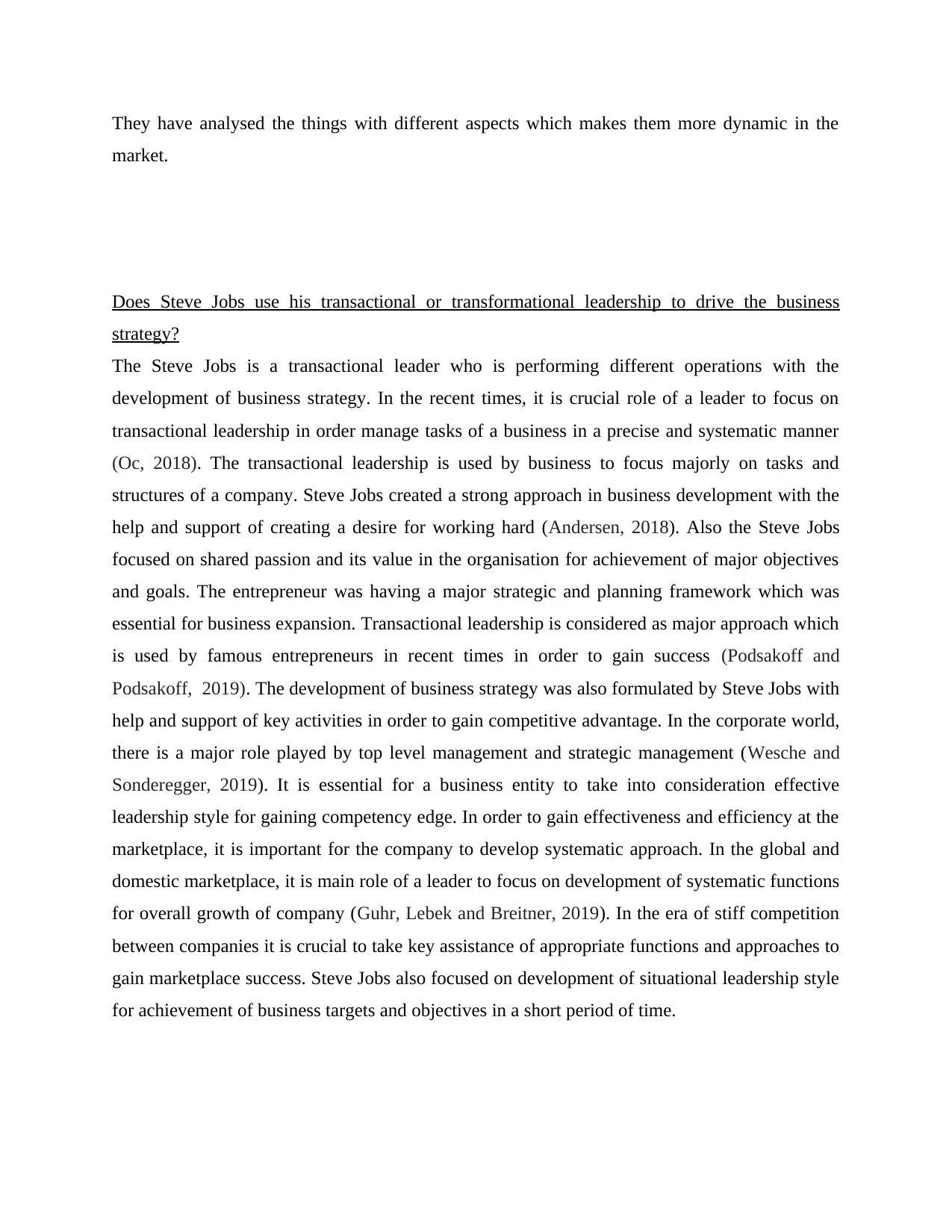
They have analysed the things with different aspects which makes them more dynamic in the
market.
Does Steve Jobs use his transactional or transformational leadership to drive the business
strategy?
The Steve Jobs is a transactional leader who is performing different operations with the
development of business strategy. In the recent times, it is crucial role of a leader to focus on
transactional leadership in order manage tasks of a business in a precise and systematic manner
(Oc, 2018). The transactional leadership is used by business to focus majorly on tasks and
structures of a company. Steve Jobs created a strong approach in business development with the
help and support of creating a desire for working hard (Andersen, 2018). Also the Steve Jobs
focused on shared passion and its value in the organisation for achievement of major objectives
and goals. The entrepreneur was having a major strategic and planning framework which was
essential for business expansion. Transactional leadership is considered as major approach which
is used by famous entrepreneurs in recent times in order to gain success (Podsakoff and
Podsakoff, 2019). The development of business strategy was also formulated by Steve Jobs with
help and support of key activities in order to gain competitive advantage. In the corporate world,
there is a major role played by top level management and strategic management (Wesche and
Sonderegger, 2019). It is essential for a business entity to take into consideration effective
leadership style for gaining competency edge. In order to gain effectiveness and efficiency at the
marketplace, it is important for the company to develop systematic approach. In the global and
domestic marketplace, it is main role of a leader to focus on development of systematic functions
for overall growth of company (Guhr, Lebek and Breitner, 2019). In the era of stiff competition
between companies it is crucial to take key assistance of appropriate functions and approaches to
gain marketplace success. Steve Jobs also focused on development of situational leadership style
for achievement of business targets and objectives in a short period of time.
market.
Does Steve Jobs use his transactional or transformational leadership to drive the business
strategy?
The Steve Jobs is a transactional leader who is performing different operations with the
development of business strategy. In the recent times, it is crucial role of a leader to focus on
transactional leadership in order manage tasks of a business in a precise and systematic manner
(Oc, 2018). The transactional leadership is used by business to focus majorly on tasks and
structures of a company. Steve Jobs created a strong approach in business development with the
help and support of creating a desire for working hard (Andersen, 2018). Also the Steve Jobs
focused on shared passion and its value in the organisation for achievement of major objectives
and goals. The entrepreneur was having a major strategic and planning framework which was
essential for business expansion. Transactional leadership is considered as major approach which
is used by famous entrepreneurs in recent times in order to gain success (Podsakoff and
Podsakoff, 2019). The development of business strategy was also formulated by Steve Jobs with
help and support of key activities in order to gain competitive advantage. In the corporate world,
there is a major role played by top level management and strategic management (Wesche and
Sonderegger, 2019). It is essential for a business entity to take into consideration effective
leadership style for gaining competency edge. In order to gain effectiveness and efficiency at the
marketplace, it is important for the company to develop systematic approach. In the global and
domestic marketplace, it is main role of a leader to focus on development of systematic functions
for overall growth of company (Guhr, Lebek and Breitner, 2019). In the era of stiff competition
between companies it is crucial to take key assistance of appropriate functions and approaches to
gain marketplace success. Steve Jobs also focused on development of situational leadership style
for achievement of business targets and objectives in a short period of time.
⊘ This is a preview!⊘
Do you want full access?
Subscribe today to unlock all pages.

Trusted by 1+ million students worldwide
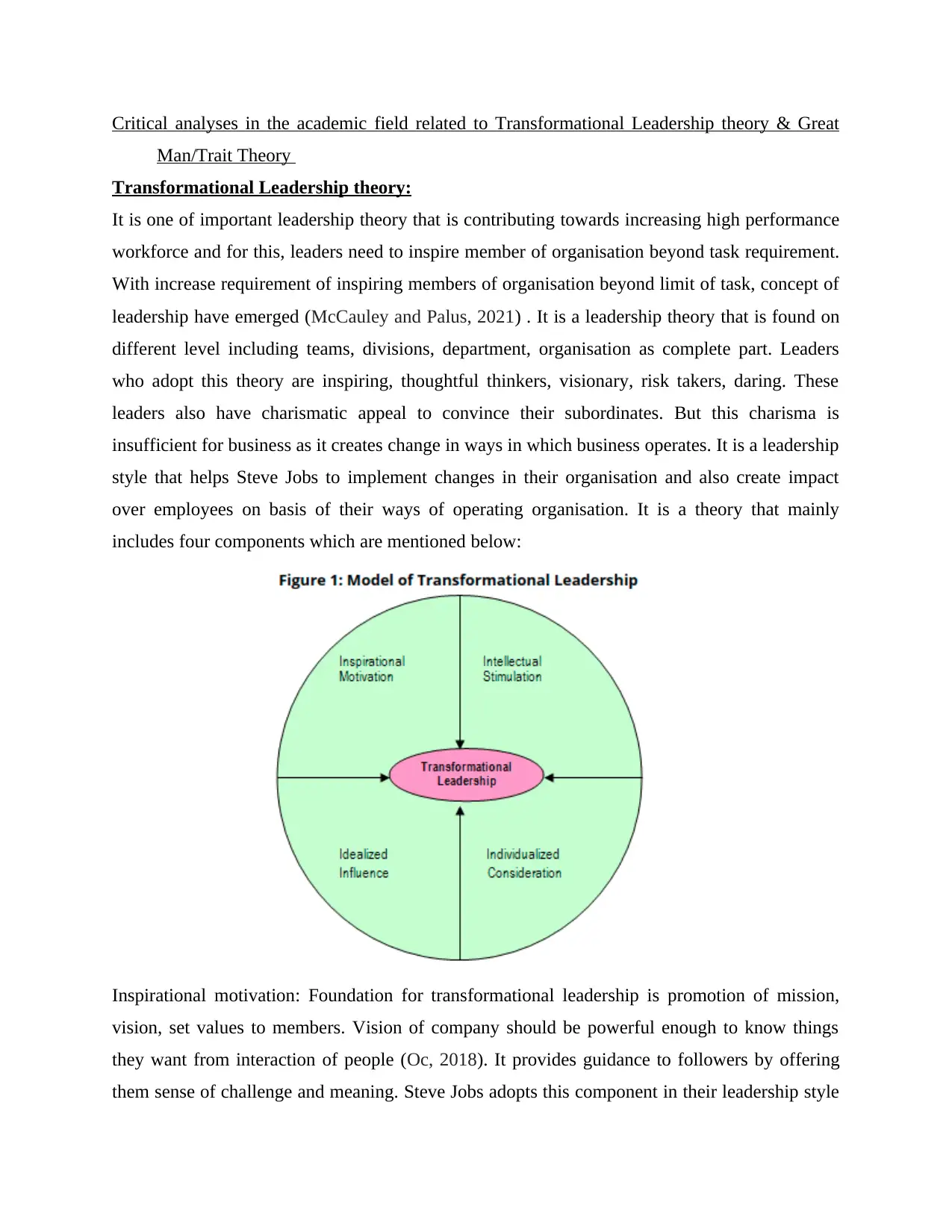
Critical analyses in the academic field related to Transformational Leadership theory & Great
Man/Trait Theory
Transformational Leadership theory:
It is one of important leadership theory that is contributing towards increasing high performance
workforce and for this, leaders need to inspire member of organisation beyond task requirement.
With increase requirement of inspiring members of organisation beyond limit of task, concept of
leadership have emerged (McCauley and Palus, 2021) . It is a leadership theory that is found on
different level including teams, divisions, department, organisation as complete part. Leaders
who adopt this theory are inspiring, thoughtful thinkers, visionary, risk takers, daring. These
leaders also have charismatic appeal to convince their subordinates. But this charisma is
insufficient for business as it creates change in ways in which business operates. It is a leadership
style that helps Steve Jobs to implement changes in their organisation and also create impact
over employees on basis of their ways of operating organisation. It is a theory that mainly
includes four components which are mentioned below:
Inspirational motivation: Foundation for transformational leadership is promotion of mission,
vision, set values to members. Vision of company should be powerful enough to know things
they want from interaction of people (Oc, 2018). It provides guidance to followers by offering
them sense of challenge and meaning. Steve Jobs adopts this component in their leadership style
Man/Trait Theory
Transformational Leadership theory:
It is one of important leadership theory that is contributing towards increasing high performance
workforce and for this, leaders need to inspire member of organisation beyond task requirement.
With increase requirement of inspiring members of organisation beyond limit of task, concept of
leadership have emerged (McCauley and Palus, 2021) . It is a leadership theory that is found on
different level including teams, divisions, department, organisation as complete part. Leaders
who adopt this theory are inspiring, thoughtful thinkers, visionary, risk takers, daring. These
leaders also have charismatic appeal to convince their subordinates. But this charisma is
insufficient for business as it creates change in ways in which business operates. It is a leadership
style that helps Steve Jobs to implement changes in their organisation and also create impact
over employees on basis of their ways of operating organisation. It is a theory that mainly
includes four components which are mentioned below:
Inspirational motivation: Foundation for transformational leadership is promotion of mission,
vision, set values to members. Vision of company should be powerful enough to know things
they want from interaction of people (Oc, 2018). It provides guidance to followers by offering
them sense of challenge and meaning. Steve Jobs adopts this component in their leadership style
Paraphrase This Document
Need a fresh take? Get an instant paraphrase of this document with our AI Paraphraser
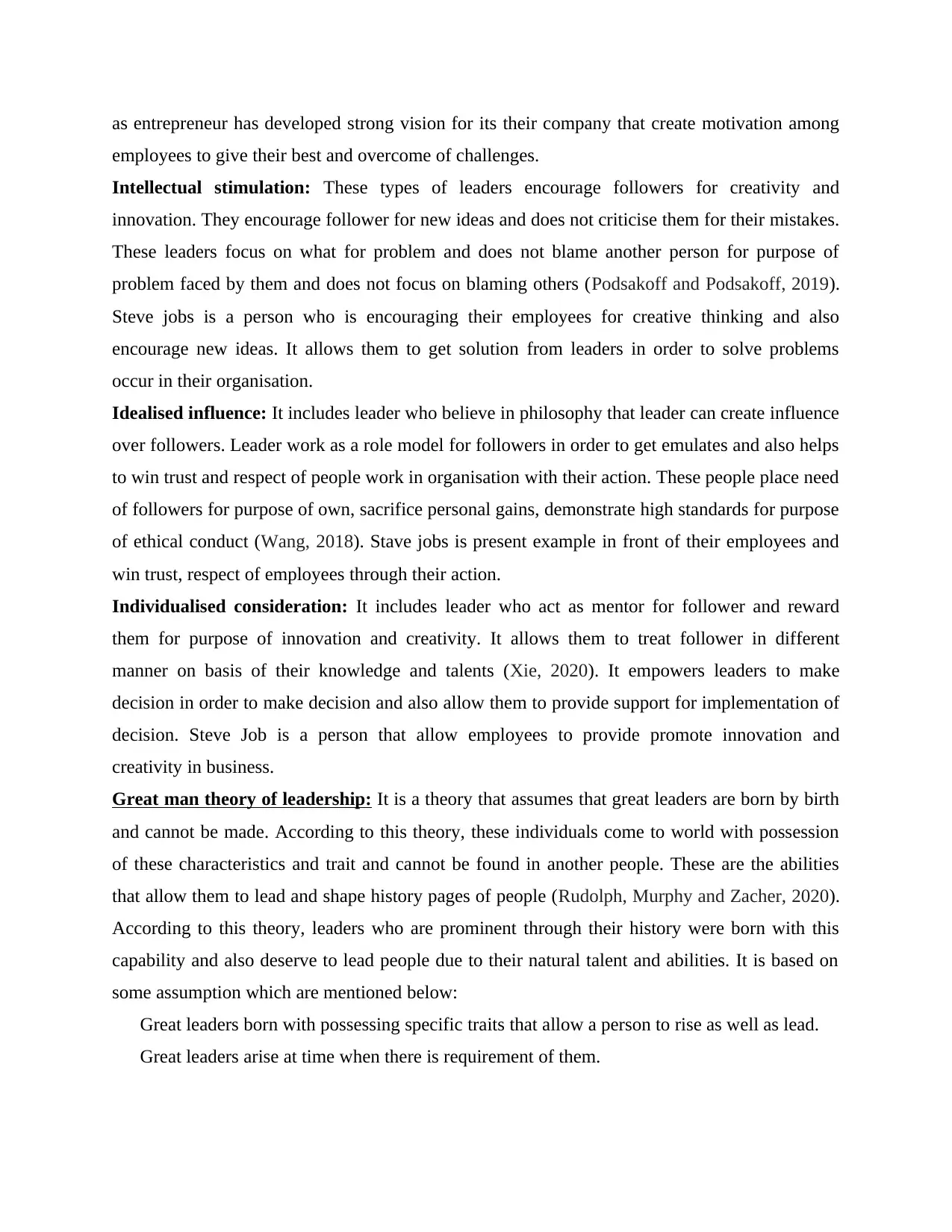
as entrepreneur has developed strong vision for its their company that create motivation among
employees to give their best and overcome of challenges.
Intellectual stimulation: These types of leaders encourage followers for creativity and
innovation. They encourage follower for new ideas and does not criticise them for their mistakes.
These leaders focus on what for problem and does not blame another person for purpose of
problem faced by them and does not focus on blaming others (Podsakoff and Podsakoff, 2019).
Steve jobs is a person who is encouraging their employees for creative thinking and also
encourage new ideas. It allows them to get solution from leaders in order to solve problems
occur in their organisation.
Idealised influence: It includes leader who believe in philosophy that leader can create influence
over followers. Leader work as a role model for followers in order to get emulates and also helps
to win trust and respect of people work in organisation with their action. These people place need
of followers for purpose of own, sacrifice personal gains, demonstrate high standards for purpose
of ethical conduct (Wang, 2018). Stave jobs is present example in front of their employees and
win trust, respect of employees through their action.
Individualised consideration: It includes leader who act as mentor for follower and reward
them for purpose of innovation and creativity. It allows them to treat follower in different
manner on basis of their knowledge and talents (Xie, 2020). It empowers leaders to make
decision in order to make decision and also allow them to provide support for implementation of
decision. Steve Job is a person that allow employees to provide promote innovation and
creativity in business.
Great man theory of leadership: It is a theory that assumes that great leaders are born by birth
and cannot be made. According to this theory, these individuals come to world with possession
of these characteristics and trait and cannot be found in another people. These are the abilities
that allow them to lead and shape history pages of people (Rudolph, Murphy and Zacher, 2020).
According to this theory, leaders who are prominent through their history were born with this
capability and also deserve to lead people due to their natural talent and abilities. It is based on
some assumption which are mentioned below:
Great leaders born with possessing specific traits that allow a person to rise as well as lead.
Great leaders arise at time when there is requirement of them.
employees to give their best and overcome of challenges.
Intellectual stimulation: These types of leaders encourage followers for creativity and
innovation. They encourage follower for new ideas and does not criticise them for their mistakes.
These leaders focus on what for problem and does not blame another person for purpose of
problem faced by them and does not focus on blaming others (Podsakoff and Podsakoff, 2019).
Steve jobs is a person who is encouraging their employees for creative thinking and also
encourage new ideas. It allows them to get solution from leaders in order to solve problems
occur in their organisation.
Idealised influence: It includes leader who believe in philosophy that leader can create influence
over followers. Leader work as a role model for followers in order to get emulates and also helps
to win trust and respect of people work in organisation with their action. These people place need
of followers for purpose of own, sacrifice personal gains, demonstrate high standards for purpose
of ethical conduct (Wang, 2018). Stave jobs is present example in front of their employees and
win trust, respect of employees through their action.
Individualised consideration: It includes leader who act as mentor for follower and reward
them for purpose of innovation and creativity. It allows them to treat follower in different
manner on basis of their knowledge and talents (Xie, 2020). It empowers leaders to make
decision in order to make decision and also allow them to provide support for implementation of
decision. Steve Job is a person that allow employees to provide promote innovation and
creativity in business.
Great man theory of leadership: It is a theory that assumes that great leaders are born by birth
and cannot be made. According to this theory, these individuals come to world with possession
of these characteristics and trait and cannot be found in another people. These are the abilities
that allow them to lead and shape history pages of people (Rudolph, Murphy and Zacher, 2020).
According to this theory, leaders who are prominent through their history were born with this
capability and also deserve to lead people due to their natural talent and abilities. It is based on
some assumption which are mentioned below:
Great leaders born with possessing specific traits that allow a person to rise as well as lead.
Great leaders arise at time when there is requirement of them.
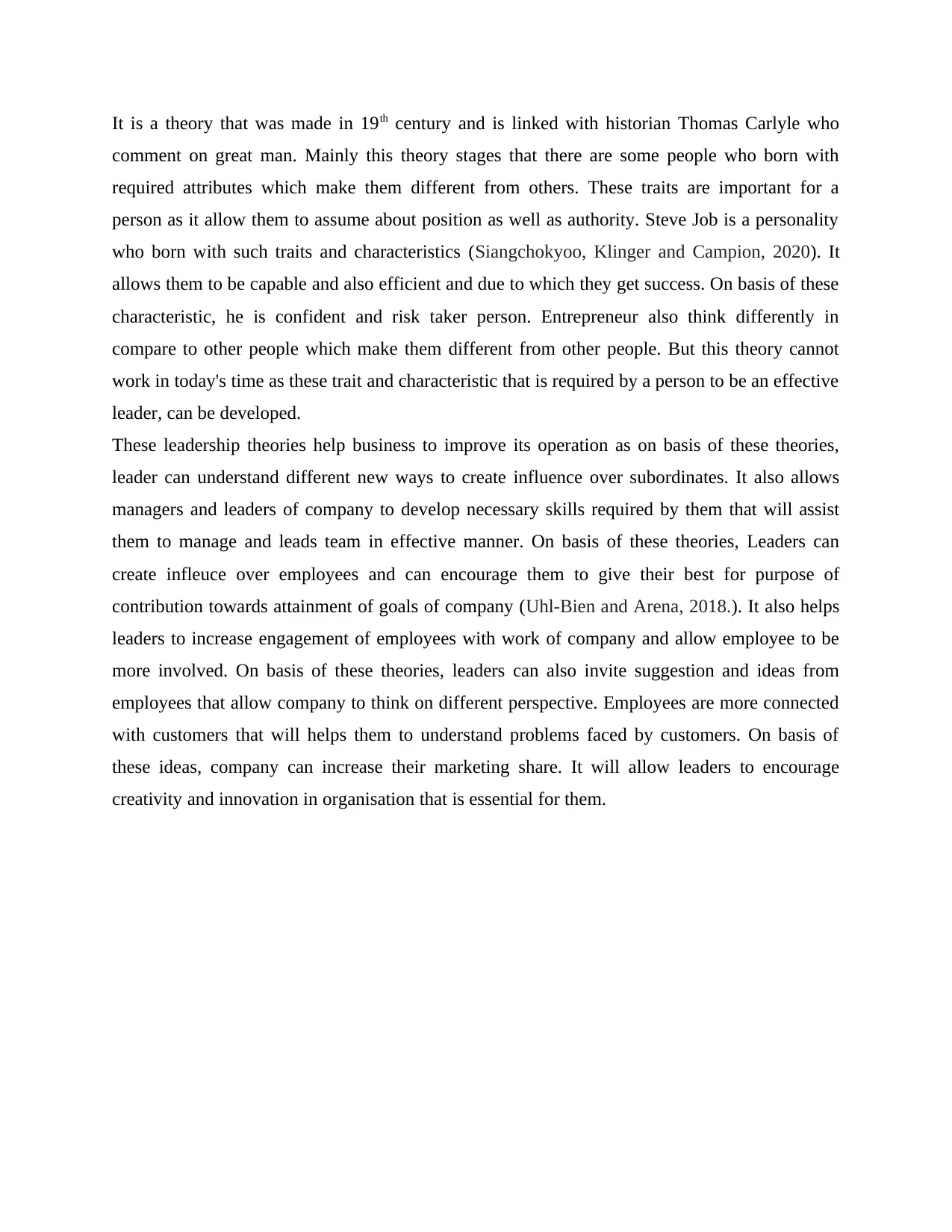
It is a theory that was made in 19th century and is linked with historian Thomas Carlyle who
comment on great man. Mainly this theory stages that there are some people who born with
required attributes which make them different from others. These traits are important for a
person as it allow them to assume about position as well as authority. Steve Job is a personality
who born with such traits and characteristics (Siangchokyoo, Klinger and Campion, 2020). It
allows them to be capable and also efficient and due to which they get success. On basis of these
characteristic, he is confident and risk taker person. Entrepreneur also think differently in
compare to other people which make them different from other people. But this theory cannot
work in today's time as these trait and characteristic that is required by a person to be an effective
leader, can be developed.
These leadership theories help business to improve its operation as on basis of these theories,
leader can understand different new ways to create influence over subordinates. It also allows
managers and leaders of company to develop necessary skills required by them that will assist
them to manage and leads team in effective manner. On basis of these theories, Leaders can
create infleuce over employees and can encourage them to give their best for purpose of
contribution towards attainment of goals of company (Uhl-Bien and Arena, 2018.). It also helps
leaders to increase engagement of employees with work of company and allow employee to be
more involved. On basis of these theories, leaders can also invite suggestion and ideas from
employees that allow company to think on different perspective. Employees are more connected
with customers that will helps them to understand problems faced by customers. On basis of
these ideas, company can increase their marketing share. It will allow leaders to encourage
creativity and innovation in organisation that is essential for them.
comment on great man. Mainly this theory stages that there are some people who born with
required attributes which make them different from others. These traits are important for a
person as it allow them to assume about position as well as authority. Steve Job is a personality
who born with such traits and characteristics (Siangchokyoo, Klinger and Campion, 2020). It
allows them to be capable and also efficient and due to which they get success. On basis of these
characteristic, he is confident and risk taker person. Entrepreneur also think differently in
compare to other people which make them different from other people. But this theory cannot
work in today's time as these trait and characteristic that is required by a person to be an effective
leader, can be developed.
These leadership theories help business to improve its operation as on basis of these theories,
leader can understand different new ways to create influence over subordinates. It also allows
managers and leaders of company to develop necessary skills required by them that will assist
them to manage and leads team in effective manner. On basis of these theories, Leaders can
create infleuce over employees and can encourage them to give their best for purpose of
contribution towards attainment of goals of company (Uhl-Bien and Arena, 2018.). It also helps
leaders to increase engagement of employees with work of company and allow employee to be
more involved. On basis of these theories, leaders can also invite suggestion and ideas from
employees that allow company to think on different perspective. Employees are more connected
with customers that will helps them to understand problems faced by customers. On basis of
these ideas, company can increase their marketing share. It will allow leaders to encourage
creativity and innovation in organisation that is essential for them.
⊘ This is a preview!⊘
Do you want full access?
Subscribe today to unlock all pages.

Trusted by 1+ million students worldwide

CONCLUSION
It is concluded from this report that leadership is one of the most important aspect of the
organisation because it helps to increase the productivity and effectiveness of the organisation. It
is said in previous times that the development of leadership skills are not possible and they all
are developed in the personality of individual along with their birth concluded to be wrong
because the leadership abilities are developed by the person with their efforts and training. There
are different types of leadership styles are present which should be present in the leaders are
concluded in this report. Steve jobs has different types of leadership skills and traits in their
personality which is used by them to make their organisation more competitive are concluded in
this report. Steve jobs has used effective communication strategies in their business are
concluded in this report. These strategies are used by the management to established effective
communication in the workplace which helps the employees to interact with each other and to
develop effective relations. This report also concluded different types of leadership theories such
as transaction, transformational and many more.
It is concluded from this report that leadership is one of the most important aspect of the
organisation because it helps to increase the productivity and effectiveness of the organisation. It
is said in previous times that the development of leadership skills are not possible and they all
are developed in the personality of individual along with their birth concluded to be wrong
because the leadership abilities are developed by the person with their efforts and training. There
are different types of leadership styles are present which should be present in the leaders are
concluded in this report. Steve jobs has different types of leadership skills and traits in their
personality which is used by them to make their organisation more competitive are concluded in
this report. Steve jobs has used effective communication strategies in their business are
concluded in this report. These strategies are used by the management to established effective
communication in the workplace which helps the employees to interact with each other and to
develop effective relations. This report also concluded different types of leadership theories such
as transaction, transformational and many more.
Paraphrase This Document
Need a fresh take? Get an instant paraphrase of this document with our AI Paraphraser
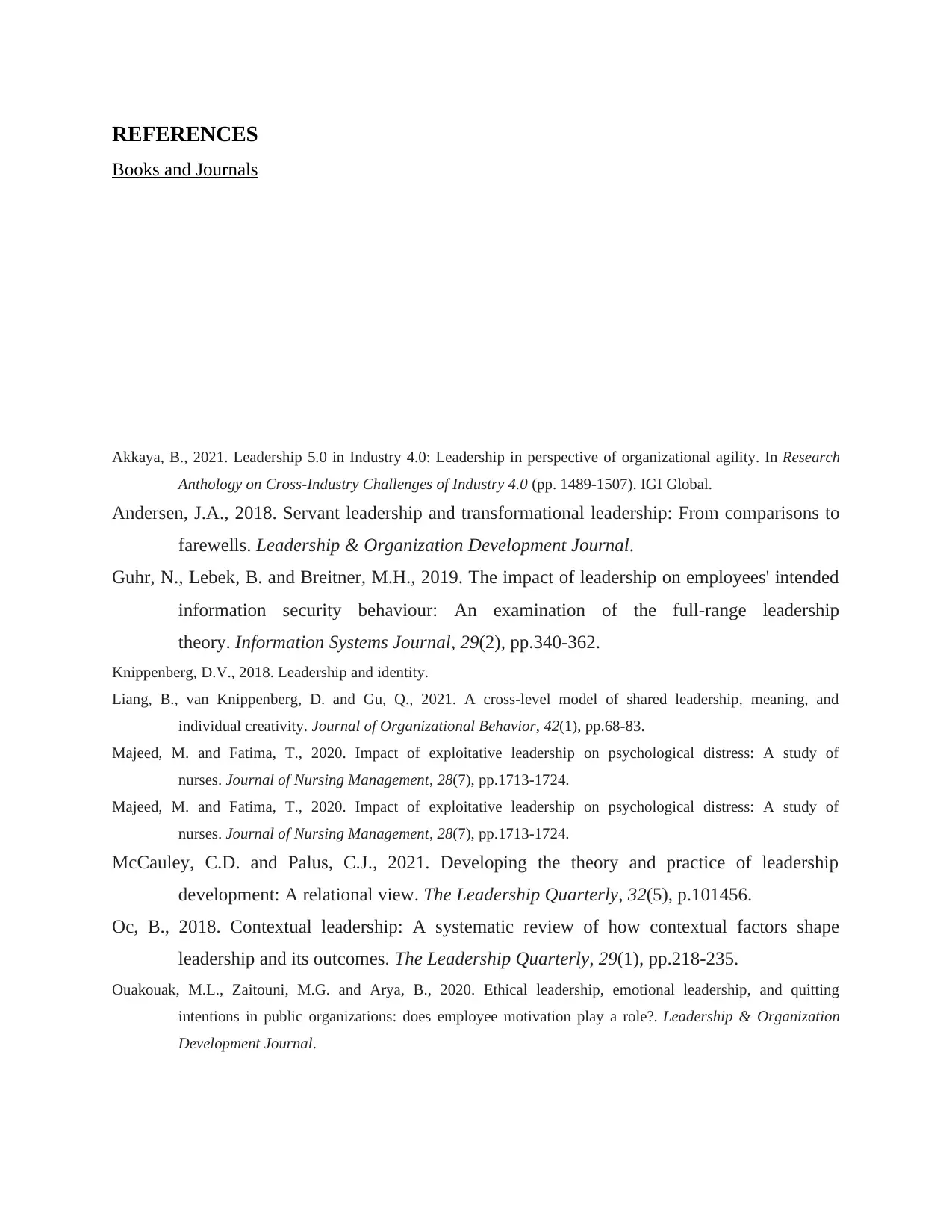
REFERENCES
Books and Journals
Akkaya, B., 2021. Leadership 5.0 in Industry 4.0: Leadership in perspective of organizational agility. In Research
Anthology on Cross-Industry Challenges of Industry 4.0 (pp. 1489-1507). IGI Global.
Andersen, J.A., 2018. Servant leadership and transformational leadership: From comparisons to
farewells. Leadership & Organization Development Journal.
Guhr, N., Lebek, B. and Breitner, M.H., 2019. The impact of leadership on employees' intended
information security behaviour: An examination of the full‐range leadership
theory. Information Systems Journal, 29(2), pp.340-362.
Knippenberg, D.V., 2018. Leadership and identity.
Liang, B., van Knippenberg, D. and Gu, Q., 2021. A cross‐level model of shared leadership, meaning, and
individual creativity. Journal of Organizational Behavior, 42(1), pp.68-83.
Majeed, M. and Fatima, T., 2020. Impact of exploitative leadership on psychological distress: A study of
nurses. Journal of Nursing Management, 28(7), pp.1713-1724.
Majeed, M. and Fatima, T., 2020. Impact of exploitative leadership on psychological distress: A study of
nurses. Journal of Nursing Management, 28(7), pp.1713-1724.
McCauley, C.D. and Palus, C.J., 2021. Developing the theory and practice of leadership
development: A relational view. The Leadership Quarterly, 32(5), p.101456.
Oc, B., 2018. Contextual leadership: A systematic review of how contextual factors shape
leadership and its outcomes. The Leadership Quarterly, 29(1), pp.218-235.
Ouakouak, M.L., Zaitouni, M.G. and Arya, B., 2020. Ethical leadership, emotional leadership, and quitting
intentions in public organizations: does employee motivation play a role?. Leadership & Organization
Development Journal.
Books and Journals
Akkaya, B., 2021. Leadership 5.0 in Industry 4.0: Leadership in perspective of organizational agility. In Research
Anthology on Cross-Industry Challenges of Industry 4.0 (pp. 1489-1507). IGI Global.
Andersen, J.A., 2018. Servant leadership and transformational leadership: From comparisons to
farewells. Leadership & Organization Development Journal.
Guhr, N., Lebek, B. and Breitner, M.H., 2019. The impact of leadership on employees' intended
information security behaviour: An examination of the full‐range leadership
theory. Information Systems Journal, 29(2), pp.340-362.
Knippenberg, D.V., 2018. Leadership and identity.
Liang, B., van Knippenberg, D. and Gu, Q., 2021. A cross‐level model of shared leadership, meaning, and
individual creativity. Journal of Organizational Behavior, 42(1), pp.68-83.
Majeed, M. and Fatima, T., 2020. Impact of exploitative leadership on psychological distress: A study of
nurses. Journal of Nursing Management, 28(7), pp.1713-1724.
Majeed, M. and Fatima, T., 2020. Impact of exploitative leadership on psychological distress: A study of
nurses. Journal of Nursing Management, 28(7), pp.1713-1724.
McCauley, C.D. and Palus, C.J., 2021. Developing the theory and practice of leadership
development: A relational view. The Leadership Quarterly, 32(5), p.101456.
Oc, B., 2018. Contextual leadership: A systematic review of how contextual factors shape
leadership and its outcomes. The Leadership Quarterly, 29(1), pp.218-235.
Ouakouak, M.L., Zaitouni, M.G. and Arya, B., 2020. Ethical leadership, emotional leadership, and quitting
intentions in public organizations: does employee motivation play a role?. Leadership & Organization
Development Journal.
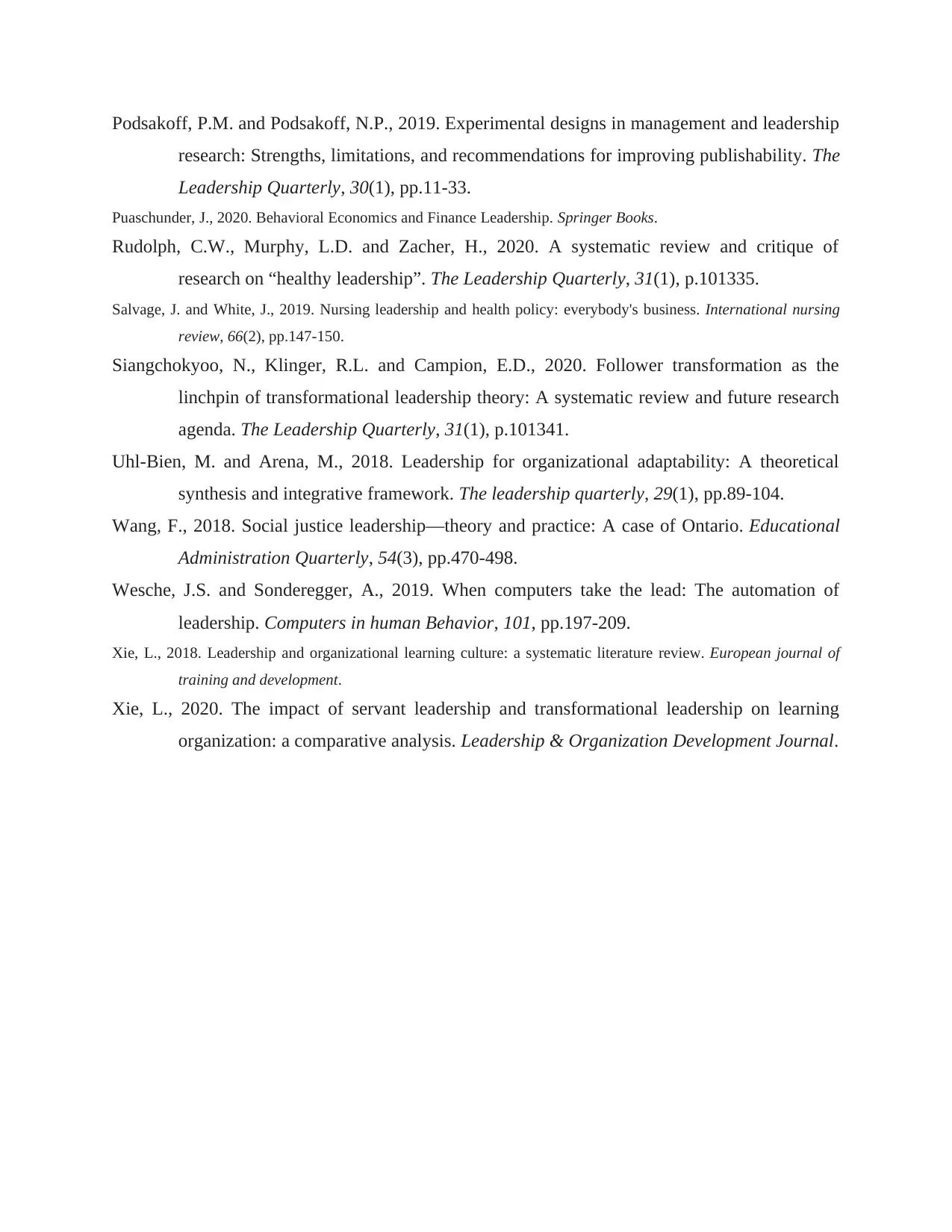
Podsakoff, P.M. and Podsakoff, N.P., 2019. Experimental designs in management and leadership
research: Strengths, limitations, and recommendations for improving publishability. The
Leadership Quarterly, 30(1), pp.11-33.
Puaschunder, J., 2020. Behavioral Economics and Finance Leadership. Springer Books.
Rudolph, C.W., Murphy, L.D. and Zacher, H., 2020. A systematic review and critique of
research on “healthy leadership”. The Leadership Quarterly, 31(1), p.101335.
Salvage, J. and White, J., 2019. Nursing leadership and health policy: everybody's business. International nursing
review, 66(2), pp.147-150.
Siangchokyoo, N., Klinger, R.L. and Campion, E.D., 2020. Follower transformation as the
linchpin of transformational leadership theory: A systematic review and future research
agenda. The Leadership Quarterly, 31(1), p.101341.
Uhl-Bien, M. and Arena, M., 2018. Leadership for organizational adaptability: A theoretical
synthesis and integrative framework. The leadership quarterly, 29(1), pp.89-104.
Wang, F., 2018. Social justice leadership—theory and practice: A case of Ontario. Educational
Administration Quarterly, 54(3), pp.470-498.
Wesche, J.S. and Sonderegger, A., 2019. When computers take the lead: The automation of
leadership. Computers in human Behavior, 101, pp.197-209.
Xie, L., 2018. Leadership and organizational learning culture: a systematic literature review. European journal of
training and development.
Xie, L., 2020. The impact of servant leadership and transformational leadership on learning
organization: a comparative analysis. Leadership & Organization Development Journal.
research: Strengths, limitations, and recommendations for improving publishability. The
Leadership Quarterly, 30(1), pp.11-33.
Puaschunder, J., 2020. Behavioral Economics and Finance Leadership. Springer Books.
Rudolph, C.W., Murphy, L.D. and Zacher, H., 2020. A systematic review and critique of
research on “healthy leadership”. The Leadership Quarterly, 31(1), p.101335.
Salvage, J. and White, J., 2019. Nursing leadership and health policy: everybody's business. International nursing
review, 66(2), pp.147-150.
Siangchokyoo, N., Klinger, R.L. and Campion, E.D., 2020. Follower transformation as the
linchpin of transformational leadership theory: A systematic review and future research
agenda. The Leadership Quarterly, 31(1), p.101341.
Uhl-Bien, M. and Arena, M., 2018. Leadership for organizational adaptability: A theoretical
synthesis and integrative framework. The leadership quarterly, 29(1), pp.89-104.
Wang, F., 2018. Social justice leadership—theory and practice: A case of Ontario. Educational
Administration Quarterly, 54(3), pp.470-498.
Wesche, J.S. and Sonderegger, A., 2019. When computers take the lead: The automation of
leadership. Computers in human Behavior, 101, pp.197-209.
Xie, L., 2018. Leadership and organizational learning culture: a systematic literature review. European journal of
training and development.
Xie, L., 2020. The impact of servant leadership and transformational leadership on learning
organization: a comparative analysis. Leadership & Organization Development Journal.
⊘ This is a preview!⊘
Do you want full access?
Subscribe today to unlock all pages.

Trusted by 1+ million students worldwide
1 out of 15
Related Documents
Your All-in-One AI-Powered Toolkit for Academic Success.
+13062052269
info@desklib.com
Available 24*7 on WhatsApp / Email
![[object Object]](/_next/static/media/star-bottom.7253800d.svg)
Unlock your academic potential
Copyright © 2020–2026 A2Z Services. All Rights Reserved. Developed and managed by ZUCOL.




